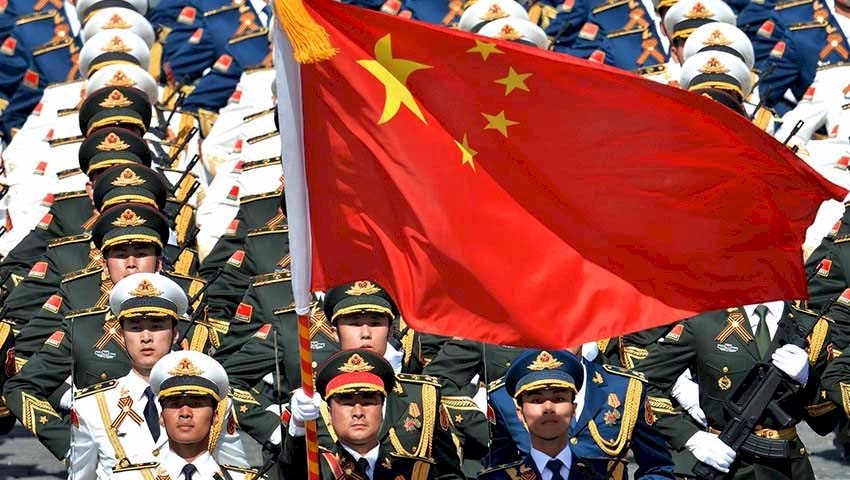Australia and its allies must build global resilience to the CCP’s coercive strategy to further its military interests through its expansive port network, analysts warn.
To continue reading the rest of this article, please log in.
Create free account to get unlimited news articles and more!
Charlie Lyons Jones, researcher at the Australian Strategic Policy Institute (ASPI), and Raphael Veit, managing director, Asia Pacific, at consultancy firm NAMEA Group, warn of a covert commercial network employed by Beijing to support the overt military strategy of the Chinese Communist Party’s (CCP) People’s Liberation Army (PLA).
This “commercial wing” of the CCP, they write, is embedded in all of China’s state-owned enterprises (SOEs).
“These SOEs operate in a hybrid fashion, seeking out business ventures that generate profits while carrying out the interests of the Chinese state,” the analysts observe.
They note that these SOEs are legally required to report to a member of the CCP, with party representatives holding senior positions on the company’s board.
“This organisational structure makes sure that any business ventures undertaken by the SOE serve the interests of the company, the state and, most importantly, the CCP,” they continue.
“Xi Jinping has accelerated the party’s dominance over the state, military, nation and business. Chinese companies are expected to do the party’s work even if that means collaborating with its armed wing in the PLA or working with its political warfare agencies like the United Front Work Department.
“Under Xi Jinping’s leadership, the CCP is seeking to apply its internal disciplinary code to Chinese SOEs strictly and extra-territorially.”
The analysts make reference to two major Chinese maritime SOEs, COSCO and China Merchants, which host the CCP’s “organs of political influence, its disciplinary apparatus and its militarised branch”. The companies have headed up China’s overseas port operations and international maritime logistics.
Jones and Veit warn that Chinese President Xi Jinping’s “bid for total control” over China’s SOEs would have “profound implications” for countries accepting foreign investment from the regime.
“Before Xi, the national security risks posed by the CCP’s integration into China’s SOEs could be ameliorated by requiring investigation, transparency and disclosure during a country’s foreign investment review process,” they add.
“These measures are no longer sufficient now that Xi has begun to strengthen his grip on the CCP and wield the coercive elements China’s national power.
“Chinese companies are required by the country’s domestic law to assist with intelligence collection and national defence mobilisation. We should expect China’s SOEs to comply with any legitimate request by the CCP to assist with either mission in peace, war or the grey zone in between.”
The analysts suggest that such SOEs are already providing direct support for the CCP’s broader strategic interests, with COSCO operating its own militia, likely to be capable of conducting paramilitary activities such as maritime surveillance, counter-piracy missions and search-and-rescue operations.
“COSCO appears to be developing the capability needed to comply with CCP requests to assist with intelligence operations, national defence mobilisation or grey-zone activities,” they write.
The analysts contend that Australia and its allies, including the US and Japan, can no longer take a “reactive approach” to the expansion of China’s overseas port operations.
“Together, COSCO and China Merchants operate 36 ports around the world. If Chinese SOEs assume control of any more ports, Beijing will have secure access to some of the world’s most crucial shipping nodes and logistics hubs,” the analyst note.
“In wartime, that could significantly undermine the freedom of action that Australia or its allies would need to defend their maritime interests and sea lines of communication.”
The analysts stressed that Australia and its allies must help build the resilience of countries that may be vulnerable to the CCP’s coercive tactics.
“Coercion need not come from the PLA engaging in denial operations to secure access to a port shortly before a war breaks out or from an offensive cyberattack on a port’s digital infrastructure,” they write.
“Under Xi, the CCP has proven all too willing to rely on organs such as the United Front Work Department to orchestrate active-measures campaigns designed to compromise a country’s sovereign decision-making. Chinese SOEs may not be drivers behind such activities, but they offer the vehicles for them.
“Australia, Japan and the US have some of the tools needed to help build countries’ resilience to coercion from the Chinese regime.”
Jones and Veit claim Australia and its partners could begin by developing an “international ports strategy through the ‘blue-dot network’, which was established in 2019 as a means of setting standards for high-quality infrastructure projects.
“Canberra, Tokyo and Washington should use the network to create a ‘Michelin guide’ for international port operations and investments,” they write.
“They could then post diplomatic personnel with expertise in critical infrastructure to agreed strategic locations around the world to promote blue-dot alternatives to investments backed by Chinese SOEs as well as advise on how to counter foreign interference.”
The analysts conclude: “Australia and its partners don’t have the power to change the nature of the CCP – and competing with Beijing dollar-for-dollar is a non-starter. But what we can do is create a world that is more resilient to the coercive measures Xi has developed a habit of using.
“A diplomatic strategy geared towards achieving that goal would make it much harder for the CCP to continue finding the logistical hubs needed to increase the PLA’s overseas presence and secure its success in wartime or grey-zone operations.”
Get involved with the discussion and let us know your thoughts on Australia's future role and position in the Indo-Pacific region and what you would like to see from Australia's political leaders in terms of partisan and bipartisan agenda setting in the comments section below, or get in touch with

 Login
Login







